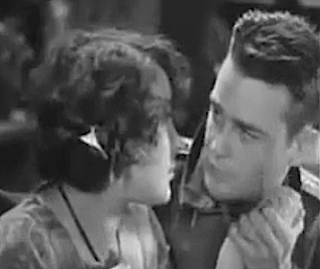On this trip through the Best Picture winners, I have made a distinct effort to watch each film with a positive attitude. (It would be a long fucking trip if I didn't). In the past I would dismiss certain films not on whether they were actually good or not but on my own tragically 16-year-old opinion. Luckily my change of heart concerning All Quiet on the Western Front has helped immensely. At this point I may find Lawrence of Arabia to be my new favorite movie*. With other films like The Life of Emile Zola, I can find good points that make the film worth watching. Or sometimes I can get a cheap thrill from the novel badness of a film like with Cimarron and Cavalcade.
I pretty much hit the wall last night with Frank Capra's You Can't Take It With You.
Capra...sigh.
I'm sort of at a loss on how to discuss this one. When in doubt, trot out the plot summary: Tony Kirby (James Stewart) is the son of the wealthy banker and is in love with his stenographer Alice Sycamore (Jean Arthur). He wishes to marry her even though she's from a lower class eccentric family: "Grandpa" Martin Vanderhof (Lionel Barrymore) was a businessman but decided he wasn't happy and became a stamp collector. Grandpa's daughter Penny Sycamore (Spring Byington) writes plays while her husband Paul (Samuel S. Hinds) makes fireworks and explosives in their cellar with live-in friend DePinna (Halliwell Hobbes). Alice's sister Essie (Ann Miller) makes candy and trains to be a ballerina under her Russian teacher Boris Kolenkhov (Mischa Auer) as her simple-minded husband Ed (Dub Taylor) sells the candy and plays the xylophone. Then there's the African-American help (Lillian Yarbo and Eddie Anderson).
Are you still with me? God, I'm so sorry.
ANYWAY, Tony and Alice want to get married but his stodgy bank president father Anthony P. Kirby (Edward Arnold) and his snobbish wife (Mary Forbes) disapprove of such a match. So Alice invites the Kirbys over to her house to show she's just as good as anyone, but Tony purposefully brings them on the wrong night when everyone is at their peak weirdness. Meanwhile, Tony's papa is working some Big Business Deal (aren't those character always?) but it--naturally--hinges on Gramps Vanderhof selling his beloved house.
So tell me, dear readers, what do you think? Do you think Grandpa will sell his house? Do you think Alice and Tony will get to live happily ever after? Do you think the avaricious Mr. Kirby will learn a valuable lesson on the importance of family and friends over money?
Well, if you're looking for spoilers, you won't find them here.
I have several problems with You Can't Take It With You. First of all, it's so...simple. Simple like it's meant for children. Small children. I feel too smart for this movie. After all, this a message we've heard a million times before and P.S. it was far more compelling with the Ghost of Christmas Past. Seriously, the Moral of the Story is presented so unsubtly and so often that I feel like I'm watching a Sunday morning Bible cartoon. (Although, admittedly, the film is surprisingly sparse on religion so we can be thankful for that).
Second problem: the characters. If you hadn't noticed, the characters are quirky; QUIRKY WITH A CAPITOL ₪. (Yeah, I know what I said.) Mama Sycamore uses a kitten as a paperweight. HAHAHAHAHAHA! Papa Sycamore is going to blow up the house. HAHAHAHAHAHA! Grandpa refuses to pay his income taxes because the government won't know what to do with the money. HAHAHAHAHAHA! Wait, I'm pretty sure that last one is illegal. But it doesn't matter because Grandpa is a lovable old coot! HAHAHAHAHA! Fuck the characters in this movie. Seriously, fuck 'em. (Well, not Jimmy Stewart because Jimmy Stewart is just doing Jimmy Stewart and who doesn't like Jimmy Stewart?)
And really, that's what it comes down to; I just don't have a taste for Capracorn. (Or should I say Crapacorn? HAHAHAHAHA!) What irritates me is how damn good It Happened One Night was just four years ago. (Although how much of the "sexiness" was owed to Clark Gable's and Claudette Colbert's own fancy is unknown. I like to think all of it.) Capra was one who embraced the Hays Code, it seems. And movies like this one lead right to his, um, masterpiece It's a Wonderful Life. You have to cut your teeth somewhere, I guess.
P.S. You Can't Take It With You is based on a play of the same name by George S. Kaufman and Moss Hart. It won the Pulitzer Prize for Drama in 1937. Think about that. The Pulitzer Prize.
Impressions circa 2004
Negative. Pap! Sentimental pap!
Other Nominations and Wins
(bold represents win)
- Best Director - Frank Capra
- Best Supporting Actress - Spring Byington
- Best Adapted Screenplay
- Best Cinematography
- Best Sound Recording
1938 Best Picture Nominees
(bold represents films I have seen...followed by my opinion in 10 words or less.)
- The Adventures of Robin Hood
- Alexander's Ragtime Band
- Boys Town
- The Citadel
- Four Daughters
- Grand Illusion
- Jezebel
- Pygmalion
- Test Pilot
What I Learned From...You Can't Take It With You
Friends and family are more important than money.
















.jpg)




























